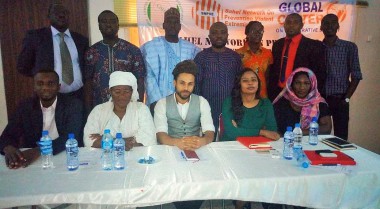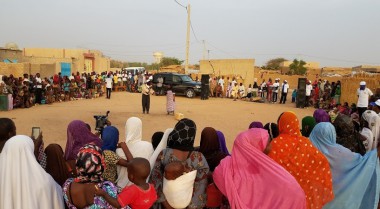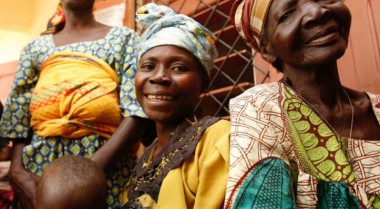
Young People Preventing Violent Extremism in the Lake Chad Basin
Threats posed by violent extremist groups has grown substantially in the countries of the Lake Chad Basin. The region which harbors about 21 million inhabitants from Cameroun, Chad, Niger and Nigeria, has some of the World's poorest and most economically vulnerable population. To counter the narratives of violent extremist groups and change perceptions of the youth population in the Lake Chad Basin towards a culture of peace, a peacebuilding approach which seeks to address root political and socioeconomic causes of extremism became important. The United Nations Security Council Resolution 2250 (UNSCR2250), adopted in 2015, requested the UN Secretary-General ‘to carry out a progress study on the youth's positive contribution to peace processes and conflict resolution, in order to recommend effective responses at local, national and international levels'.
In 2017, a study on the Role of Young People in Preventing Violent Extremism in the Lake Chad Basin was commissioned by the Civil Society Platform for Peacebuilding and Statebuilding (CSPPS) in collaboration with the Centre for Sustainable Development and Education in Africa (CSDEA) as a contribution to the global progress study on youth's positive contribution to peace processes and conflict resolution. The objective of the study was to document the role of youth-led and youth-focused conflict and extremism prevention approaches that are dynamic and promote peacebuilding. The study report provides the key findings from the data collected from Cameroun, Chad, Niger and Nigeria, where the following extremist groups operate: (i) Ansar Dine (The Success of Islam); (ii) Boko Haram and (iii) Mujao (Movement for the Consolidation of Jihadist in West Africa). They are referred to as Al-Qaida in the Sahel.
You can download the full report here, or read the summary of key findings and recommendations below.
Key recommendations for policy makers, governments, and the international community in pursuance of the implementation of UNSCR 2250:
- The International Dialogue on Peacebuilding and Statebuilding (IDPS) and other international actors should promote soft approach policy to preventing violent extremism. The IDPS should focus specifically on the Lake Chad Basin countries to support safe spaces for continuous dialogue between governments, communities and young people since the promotion of dialogue leading to sustainable peace is the main objective of the IDPS and the CSPPS – a key constituency of the IDPS.
- Improving the livelihoods of at-risk youths and other vulnerable populations through a greater focus on ‘hot spots' and improved access to jobs, skills-building programmes and education, by strengthening and scaling up existing programs.
- The rapid population growth is overstretching resources and infrastructure and rendering interventions inadequate. Population control measures should be put in place in these Lake Chad Basin countries so that the resources and intervention programs can be adequate.
- Enhancing the capacity and levels of trust in the judicial system and rule of law as a result of societies and institutions with the capacity to effectively deal with radicalization and violent extremism and which effectively balance law and order with justice; prison systems which can serve as centres for de-radicalization and reform; police and communities which can effectively cooperate towards shared goals of protection; effective investigation and protection of key stakeholders; and good regional cooperation.
- Increasing levels of disengagement and improving reintegration processes as a result of effective disengagement/rehabilitation centres; consistent psycho-social support and mentoring; good awareness of de-radicalization processes; and increased community sensitization to help lower the stigmatization of returnees.
- Discrediting violent narratives through diffusion of counter-narratives via journalists skilled in ethical reporting; a greater focus on the voices of victims, survivors and returnees; greater media engagement by religious leaders; and youth who are empowered to be leaders on- and off-line.
- Lowering intra- and inter-religious tensions and heightened community resilience of religious institutions thanks to greater intra- and inter-religious dialogue; effectively governed madrassas, mosques and well-trained Imams; and effective early-warning mechanisms.
- National Youth Policies should be implemented to the fullest, volunteerism should be regarded by government as work experience, and young people should be encouraged to explore their interests and hobbies.
- Improving differentiated and tailored responses to men, women, boys and girls as a result of greater support for women affected by radicalization and violent extremism; empowerment of women leaders and advocates for de-radicalization, and by supporting young men and women to serve as ambassadors for anti-radicalization processes.
- Content of education in Quranic schools which is the dominant form of education in the conflict affected areas of the Lake Chad Basin countries should be harmonized. It is presently in disarray with its various teachings.
- A section of youth in the informal sector who have been neglected in government programs should be integrated because they are the ones who mostly participate in violent extremist groups. Integrated programs that include education, social inclusion and financial support should be implemented.
- The role of youth and civil society as key partners of government in PVE should be stressed, PVE programs targeting youth should be more dynamic and creative.
- Government leaders and society should stop stereotyping youth. Youth are not less competent and data should be made available.
- Human rights laws and policies to protect citizens and repentant militants should be put in place to deter the military/security from arrest and extra-judicial killings.
- Anti-corruption measures should be incorporated into PVE programs and initiatives to ensure that the end beneficiaries are served as envisaged in original project documents. This will also help in reducing the politicization of PVE programs since there will not be incentives for politicians.
- The private sector should be encouraged to support youth PVE initiatives in the Lake Chad Basin countries. This study revealed that there is little or no support from the private sector to these youth initiatives in these countries. Funding from the private sector will strengthen and boost these initiatives.
For more information, please contact the CSPPS or the Author of this report:
Peter van Sluijs, Coordinator Civil Society Platform for Peacebuilding and Statebuilding (CSPPS) & Senior Strategist at Cordaid in The Netherlands – Email:Peter.van.Sluijs@cordaid.org
Mr. Theophilus Ekpon, CSPPS Focal Point in Nigeria and Executive Director of the Centre for Sustainable Development and Education in Africa (CSDEA) – Email:theophilusekpon@csdea-africa.org



